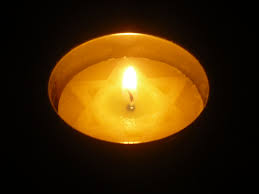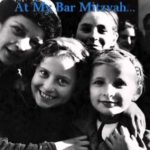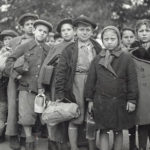 I love when my children come home eager to tell me something they learned in school that made an impression on them. I love it more when they assume they are telling me something I would have never heard before and they are eager to teach me.
I love when my children come home eager to tell me something they learned in school that made an impression on them. I love it more when they assume they are telling me something I would have never heard before and they are eager to teach me.
This past Monday we commemorated Yom Ha-Shoah – Holocaust Remembrance Day. My 8-year-old heard from her teacher about the righteous actions of Janusz Korczak, the Polish-Jeiwsh doctor who founded a Jewish orphanage in Warsaw, and went with his children to Treblinka although he had been offered the opportunity to escape. My daughter didn’t know or couldn’t remember his name, but she could retell the story, of how he wouldn’t abandon the children, how if they were not going to live, then neither was he. My older daughters were eager to fill in the missing details for their youngest sister, and I was moved by how all three of them held this story in their heart in one way or another.
In our assembly on Monday, for grades 4, 5 and 6, the grade 6 students read the poems included here. But they didn’t just read them. They performed them in a way that demonstrated how they understood and absorbed the gravity and sombreness of these poems. The students accepted and internalized their role as leaders among their peers to convey the lessons and messages of the Holocaust; they accepted and internalized that it is up to them that the lessons, the victims, the survivors, and all their stories are remembered and passed on to every generation.
After Mrs. Paula Bultz, a survivor, told her story to the assembly, Grade 6 student Aiden Shlien presented her with a thank-you card on behalf of Akiva School, and as he handed it to her he spontaneously added, “We promise we will never forget.”
Lord Rabbi Jonathan Sacks wrote: “While we can remember the past, we cannot write the future. Only our children, the future of our community, can do that.”
When what our children learn touches their heart, when they are eager to teach it to the people in their world, we have hope.
Shabbat Shalom
Debbie
Below are the poems that were read during the assembly
(Dedicated to the memory of a 13 year old hero of the Resistance.)
Reader: When I was thirteen, I became Bar Mitzvah.
Assembly: When he was 13, he became Bar Mitzvah.
Reader: When I was thirteen, my teachers taught me to put Tefillin on my arm.
Assembly: When he was 13, his teachers taught him to throw a hand grenade with his arm.
Reader: When I was thirteen, I studied the pathways of the Bible and roadways of the Talmud.
Assembly: When he was 13, he studied the canals of Warsaw and the sewers of the Ghetto.
Reader: At my Bar Mitzvah, I took an oath to live as a Jew.
Assembly: At his Bar Mitzvah, he took an oath to die as a Jew.
Reader: At my Bar Mitzvah, I blessed God.
Assembly: At his Bar Mitzvah, he questioned God.
Reader: At my Bar Mitzvah, I lifted my voice and sang.
Assembly: At his Bar Mitzvah, he lifted his fists and fought.
Reader: At my Bar Mitzvah, I read from the Scroll of the Torah.
Assembly: At his Bar Mitzvah, he wrote a Scroll of Fire.
Reader: At my Bar Mitzvah, I wore a new Tallit over a new suit.
Assembly: At his Bar Mitzvah, he wore a rifle and bullets over a suit of rags.
Reader: At my Bar Mitzvah, I started my road of life.
Assembly: At his Bar Mitzvah, he began his road to martyrdom.
Reader: At my Bar Mitzvah, family and friends came to say l’chayim.
Assembly: At his Bar Mitzvah, Rabbi Akiba and Trumpeldor, Hannah and her seven sons came to escort him to Heaven.
Reader: At my Bar Mitzvah, they praised my voice, my song, my melody.
Assembly: At his Bar Mitzvah, they praised his strength, his courage, his fearlessness.
Reader: When I was 13, I was called up to the Torah. I went to the Bimah.
Assembly: When he was 13, his body went up in smoke-his soul rose to God.
Reader: When I was 13, I became Bar Mitzvah-and lived.
Assembly: When he was 13, he became Bar Mitzvah- and lives now within each of us.
We played, we laughed, we were loved.
We were ripped from the arms of our parents and thrown into the fire.
We were nothing more than children.
We had a future.
We were going to be lawyers, rabbis, wives, teachers, mothers.
We had dreams, then we had no hope.
We were taken away in the dead of night like cattle in cars, no air to breathe smothering, crying, starving, dying. Separated from the world to be no more. From the ashes, hear our plea. This atrocity to mankind cannot happen again. Remember us, for we were the children whose dreams and lives were stolen away.
 This poem was written by Pavel Friedmann, at Theresienstadt concentration camp on 4 June 1942. On September 29, 1944 he was deported to Auschwitz where he died. There are at least two versions of The Butterfly due to different translations. Below you can find the two that we have.
This poem was written by Pavel Friedmann, at Theresienstadt concentration camp on 4 June 1942. On September 29, 1944 he was deported to Auschwitz where he died. There are at least two versions of The Butterfly due to different translations. Below you can find the two that we have.
The Butterfly
The last, the very last,
So richly, brightly, dazzlingly yellow.
Perhaps if the sun’s tears would sing
against a white stone…
Such, such a yellow
Is carried lightly ‘way up high.
It went away I’m sure because it wished
to kiss the world goodbye.
For seven weeks I’ve lived in here,
Penned up inside this ghetto
But I have found my people here.
The dandelions call to me
And the white chestnut candles in the court.
Only I never saw another butterfly.
That butterfly was the last one.
Butterflies don’t live in here,
In the ghetto.
By Pavel Friedmann





